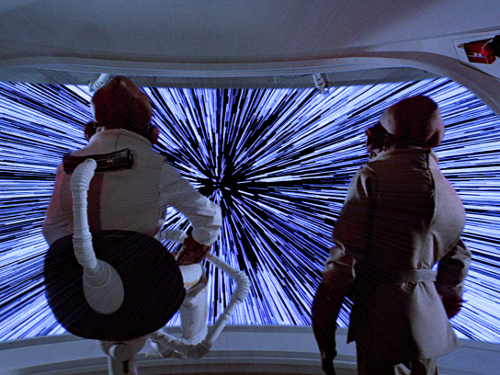Expert says light-speed travel just needs power
 Astrophysicist Professor Geraint Lewis says light speed space travel between galaxies may actually be possible.
Astrophysicist Professor Geraint Lewis says light speed space travel between galaxies may actually be possible.
Professor Lewis is delivering a talk today at the launch of National Science Week in Sydney.
He says the futuristic concept of faster-than-light travel is actually allowed for in Albert Einstein's theory of relativity.
“If you look at the equation that Einstein gave us, it shows you can bend and warp space so you can travel at any speed you like in the universe,” he told ABC reporters this morning.
“It's theoretically possible, but can we ever build a warp drive?
“We have hints that the kind of materials that we would need exist in the universe, but whether or not we could get them together and build a warp drive, we still don't know.”
Professor Lewis said warp drive would be the only way that humanity could colonise the outer parts of our galaxies, or one of the many billions of other galaxies that would currently take millions of years to reach.
“The big problem we have, the speed of light, while fast - 300,000 kilometres per second - the distances involved are immense, so even travelling at the speed of light, it would take four years to go to the nearest star and 2 million years to go to the nearest large galaxy,” he said.
“[These distances] would stop you colonising the universe ... so you would need some sort of way to beat that speed limit, and Einstein's theory of relativity gives it to you.”
He says to travel the distances at any useful speed, scientists would need to find a material with “negative density energy”.
“It is not a material that we actually have in our hands, but there are signs that there are aspects of the universe that actually have this kind of property,” Professor Lewis said.
“Empty space itself has a negative energy density. The big question is if we could mine it and shape it, we would basically have a warp drive there and then, but we just don't know if that's possible.”
Professor Lewis said that clearly the concept is theoretical for now, but “plenty of science that started off as speculative ideas and became real in the future”.
“You just have to look at the work of Newton 400 years ago, and even people who work in quantum physics 100 years ago, and those things are real today and they started off as dreams essentially.
“Einstein's theory is already a hundred years old, but we have only started to scratch the surface.
“I think in the next 100 or 1,000 years we will reveal a lot more about the universe and maybe this hyper-fast travel will be realisable,” he said.








 Print
Print